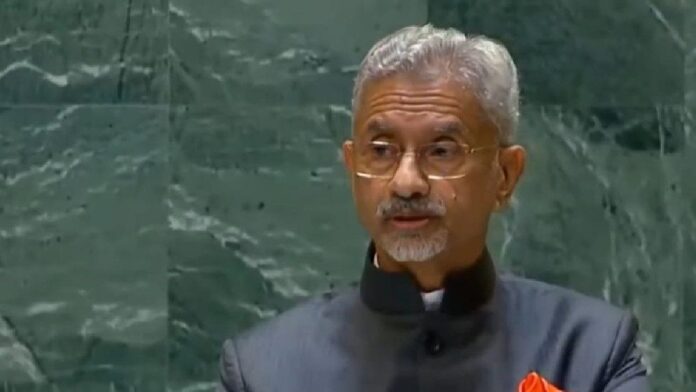
External affairs minister S Jaishankar addresses the 79th UNGA General Debate in New York. (Image: IANS/X)
Jaishankar addressed the 79th UNGA General Debate in New York and warned Pakistan against proliferation of terrorism by saying ‘action has consequences’.
External affairs minister S Jaishankar on Saturday said that the ‘ills’ Pakistan ‘sought to visit on others are now consuming its own society’ without naming the neighbouring country directly. He also stressed that vacating PoK (Pakistan-occupied Kashmir) can only resolve long standing problems between India and Pakistan along with ‘abandonment of Pakistan’s long standing attachment to terrorism’.
Watch: While addressing the general debate at the 79th session of the UN General Assembly, EAM S. Jaishankar says, “We heard some bizarre assertions from it at this very forum yesterday. So let me make India’s position perfectly clear. Pakistan’s cross-border terrorism policy… pic.twitter.com/rpo39eRPfu— IANS (@ians_india) September 28, 2024
“We see the ills it (Pakistan) sought to visit on others consume its own society. It can’t blame the world. This is only karma,” S Jaishankar said in his address to the General Debate of the 79th session of the UN General Assembly.
“Many countries get left behind due to circumstances beyond their control, but some make conscious choices with disastrous consequences. A premier example is our neighbour, Pakistan,” he said, according to a report by news agency PTI.
He also said that Pakistan’s cross-border terrorism will never succeed and its actions will “certainly have consequences”.
Jaishankar said Pakistan’s cross border terrorism policy will never succeed, and it can have no expectation of impunity.
“On the contrary, actions will certainly have consequences. The issue to be resolved between us is now only the vacation of illegally occupied Indian territory by Pakistan, and, of course, the abandonment of Pakistan’s long standing attachment to terrorism,” he said.
Dig At China’s BRI
The minister also told the UN General Assembly that unviable projects raise debt levels and any connectivity that clouds sovereignty and territorial integrity acquires strategic connotations, especially when it is not a shared endeavour, in a veiled reference to China.
Across the Global South, he said, development plans have gone off rails and Sustainable Development Goals (SDGs) targets are receding.
“But there is more. Unfair trade practices threaten jobs, just as unviable projects raise debt levels. Any connectivity that clouds sovereignty and territorial integrity acquires strategic connotations, especially when it is not a shared endeavour,” he said, in an apparent reference to China’s multi-billion-dollar Belt and Road Initiative (BRI).
“We are gathered here at a difficult time. The world is yet to recover from the ravages of the Covid pandemic. A war in Ukraine is well into its third year. The conflict in Gaza is acquiring wider ramifications,” Jaishankar further added.
He said technology advancements, which have long been a source of hope, are now equally a factor of anxiety.
“Climate events occur with greater intensity and frequency. Food security is as worrisome as health security. In truth, the world stands fractious, polarised and frustrated. Conversations have become difficult, agreements even more so. This is surely not what the founders of the United Nations would have wanted of us,” he said.
The EAM said today, both peace and prosperity are equally endangered, and that is because trust has eroded and processes have broken down.
“Countries have extracted more from the international system than they have put into it, enfeebling it in the process,” he said.
Read More: ‘This Is Karma’: At UN, Jaishankar Says Ghosts Of Pakistan’s Misdeeds Now Haunting Its Own


